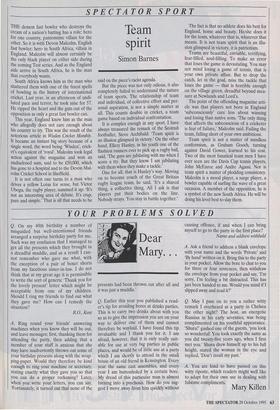SPECTATOR SPORT
Team spirit
Simon Barnes
THE demon fast bowler who destroys the cream of a nation's batting has a role: hero for one country, pantomime villain for the other. So it is with Devon Malcolm, English fast bowler: hero in South Africa, villain in England. Malcolm will almost certainly be the only black player on either side during the coming Test series. And as the England side arrive in South Africa, he is the man that everybody wants.
South Africa knows him as the man who shattered them with one of the finest spells of bowling in the history of international cricket. Last year, in an afternoon of undi- luted pace and terror, he took nine for 57. He ripped the heart and the guts out of the opposition as only a great fast bowler can.
This year, England knew him as the man who allegedly does not care enough about his country to try. This was the result of the notorious article in Wisden Cricket Monthly. It became an instant big story because of a single word, the word being Wisden', crick- et's equivalent of 'royal'. Malcolm took legal action against the magazine and won an undisclosed sum, said to be £50,000, which has gone to a hospital and to the Devon Mal- colm Cricket School in Sheffield.
It is not often one turns to a man who drives a yellow Lotus for sense, but Victor Ubogu, the rugby player, summed it up: 'It's not an interesting area of debate. It's crap, pure and simple.' That is all that needs to be said on the piece's racist agenda. But the piece was not only odious, it also completely failed to understand the nature of team sports. The relationship of team and individual, of collective effort and per- sonal aspiration, is not a simple matter at all. This counts double in cricket, a team game based on individual confrontation. It is complex enough in any sport. I have always treasured the remark of the Scottish footballer, Steve Archibald: 'Team spirit is an illusion glimpsed in victory.' On the other hand, Ellery Hanley, in his youth one of the flashiest runners ever to pick up a rugby ball, said, 'The guys are jubilating with me when I score a try. But they know I am jubilating with them when they make a tackle.'
One for all, that is Hanley's way. Moving on to become coach of the Great Britain rugby league team, he said, 'It's a shared thing, a collective thing. All I ask is that players put their bodies on the line. Nobody strays. You stay in battle together.' The fact is that no athlete does his best for England, home and beauty. He/she does it for the team, whatever that is, whatever that means. It is not team spirit that is an illu- sion glimpsed in victory, it is patriotism.
Teams are beautiful, enviable, terrifying, fear-filled, soul-filling. To make an error that loses the game is devastating. You may not mind losing a game of tennis, that is your own private affair. But to drop the catch, let in the goal, miss the tackle that loses the game — that is horrible enough on the village green, dreadful beyond mea- sure at Newlands and Lord's.
The point of the offending magazine arti- cle was that players not born in England `subconsciously' care less about winning and losing than native sons. 'The only thing that affects the subconscious of a cricketer is fear of failure,' Malcolm said. Failing the team, falling short of your own ambitions.
Team spirit is not a matter of mindless conformism, as Graham Gooch, turning against David Gower, learned to his cost. Two of the most fanatical team men I have ever seen are the Davis Cup tennis players, John McEnroe and Andre Agassi. Nor is team spirit a matter of plodding consistency. Malcolm is a mood player, a surge player, a bowler capable of surfing the wave of a great occasion. A member of the opposition, he is a symbol of the new South Africa. He will be doing his level best to slay them.


































































 Previous page
Previous page